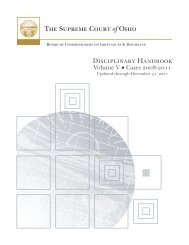The Supreme Court of Ohio - Supreme Court - State of Ohio
The Supreme Court of Ohio - Supreme Court - State of Ohio
The Supreme Court of Ohio - Supreme Court - State of Ohio
You also want an ePaper? Increase the reach of your titles
YUMPU automatically turns print PDFs into web optimized ePapers that Google loves.
Two very important realities prompted the <strong>Court</strong> to pursue<br />
the new rules. First, ubiquitous access afforded by the Internet<br />
has changed the very nature <strong>of</strong> records, as well as how they<br />
are accessed. <strong>The</strong> identity <strong>of</strong> juvenile sexual assault victims<br />
and the accounts <strong>of</strong> their victimization, the painful and highly<br />
personal details <strong>of</strong> the lives <strong>of</strong> couples seeking divorce, and the<br />
accounting <strong>of</strong> assets in a deceased<br />
Public records are the<br />
people’s records. <strong>The</strong><br />
<strong>of</strong>ficials in whose<br />
custody they happen to<br />
be are mere trustees for<br />
the people.<br />
— Hon. Rufus B. Smith<br />
1901<br />
person’s estate and the value <strong>of</strong><br />
an inheritance passed to heirs<br />
are all issues routinely brought to<br />
courts in <strong>Ohio</strong> every day. When<br />
should these records be public?<br />
<strong>The</strong> answer is, “almost always.” But<br />
the question looms large when<br />
“public” no longer means available<br />
for review in a courthouse, but<br />
now means accessible through<br />
Google, displayed on MySpace,<br />
or played on YouTube. It is this<br />
question that the rules help to answer.<br />
<strong>The</strong> second reality that necessitates these rules is a matter <strong>of</strong><br />
constitutional law. While the courts in <strong>Ohio</strong> always have acted<br />
in accordance with the Public Records Act, the act does not<br />
govern the courts. <strong>The</strong> important constitutional principle <strong>of</strong><br />
separation <strong>of</strong> powers requires that the <strong>Supreme</strong> <strong>Court</strong> <strong>of</strong> <strong>Ohio</strong><br />
regulate court records through its Rules <strong>of</strong> Superintendence for<br />
<strong>Ohio</strong> <strong>Court</strong>s.<br />
For more than 200 years, <strong>Ohio</strong> courts have balanced the<br />
fundamental principle <strong>of</strong> openness articulated so gracefully<br />
by Judge Smith, with the equally important privacy rights <strong>of</strong><br />
individuals and other societal interests. <strong>The</strong> new rules are an<br />
attempt to continue to strike this critical balance in the new<br />
information age.<br />
<strong>The</strong> rules become effective on May 1, 2009, and the <strong>Court</strong><br />
will conduct training for court personnel around the state. <strong>The</strong><br />
rules are available at supremecourt.ohio.gov.<br />
2008 Annual Report • <strong>The</strong> <strong>Supreme</strong> <strong>Court</strong> <strong>of</strong> <strong>Ohio</strong><br />
23<br />
Clerk's division<br />
Office <strong>of</strong> the Clerk<br />
Case Mediation Section
















